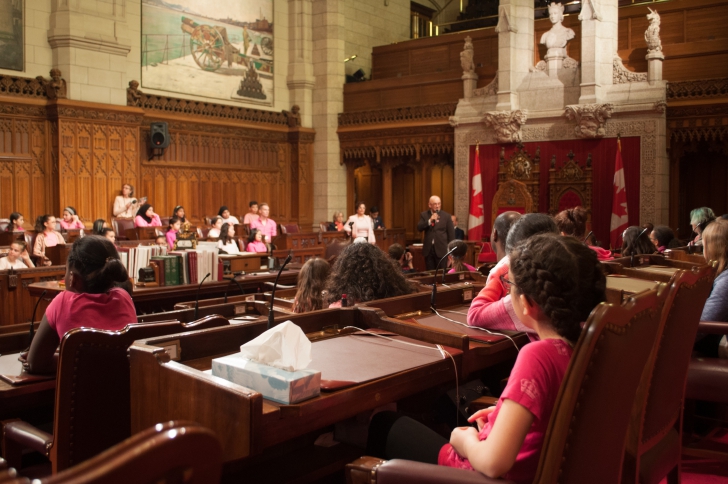Queer and trans activists, federal politicians and allies gathered in Ottawa on April 12, 2017, to take stock of the successes and the challenges still facing LGBT people in Canada.
The annual Day of Pink started when two Nova Scotia high-school students chose to wear pink in 2007 to support a classmate who was being bullied over his shirt.
This year the day was marked on Parliament Hill through a morning session in the Senate chamber, where Senator Mobina Jaffer invited elementary school children wearing pink T-shirts to hear about the dangers of bullying.
Senator René Cormier, who is gay, spoke about being picked on as a closeted child, saying that life is still not easy for many young Canadians despite a rapid increase in societal acceptance.
“Silence is intimidation’s best friend,” he said in French.

Later that evening, about 250 people gathered for a gala in downtown Ottawa run by the Canadian Centre for Gender and Sexual Diversity (CCGSD), including environment minister Catherine McKenna and members of Parliament from the three main parties.
At the gala, MP Randy Boissonnault, the prime minister’s special advisor on LGBTQ2 issues, urged people to phone senators to tell them to support trans-rights bill C-16, which is scheduled for hearings at a Senate committee for four days, starting May 4.
“There’s still work for us to do,” Boissonnault said. “We need some lesbian members of Parliament; we need trans members of Parliament; we need two-spirited members of Parliament.”
Multiple speakers mentioned the reports of gay men being rounded up and killed in Russia’s Chechnya region. Some, like NDP MP Randall Garrison, explicitly called on the federal government to demand Russia investigate the situation (which Canada’s foreign minister did in a statement three days later, but still won’t say whether Canada will take more refugees).
Garrison also raised the government’s “unfinished business,” like apologizing to queer people arrested for their sexual orientation and those purged from the military.

Jeremy Dias, head of CCGSD, said any donations collected at the gala will go to Russian activists. He said the gala made a point of starting with an indigenous circle dance to recognize two-spirit people.
“Intersectional, diverse communities are really starting to speak up louder, which is incredible and awesome,” Dias said. “Our job is to make the LGBTQ community stronger and better.”
The gala also awarded advocates, including elementary-school students, Toronto trans activist Susan Gapka, and Lori Jean Hodge, an Ottawa musician and activist who died last year from cancer.
“For me to see youth coming up like that, it’s a real hope for the future,” said Karen Benoit, who accepted the award on behalf of Hodge, her late wife.
Andrée Cooligan, Canada’s ambassador to Finland, was in town on a vacation. “It was proud and loud and really well represented,” she said, adding that the gala could be a model for countries bordering Russia.
“We have to support them,” she said. “Those countries are really struggling with their human rights these days.”

 Why you can trust Xtra
Why you can trust Xtra


